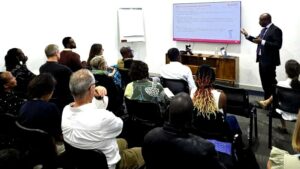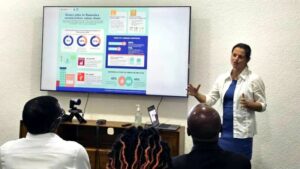IDOS researchers Dr Babette Never and Dr Alexander Stoecker, jointly with Rwandan colleague Dr Aime Tsinda, conducted a study on green jobs, sustainable growth and women’s employment in the city’s construction value chain.

On 6 November, they presented the research results in Kigali, Rwanda during an expert talk. The study is part of the BMZ-financed project “Socio-ecological Transformation of the Economy” and the “Feminist Employment Policy”-project financed by the GIZ Sector Project “Employment Promotion in Development Cooperation”.
Key Insights from the Study are:
- Sustainable Urbanisation: Kigali’s adoption of green construction practices is driving economic development and positioning the city as a leader in sustainable urbanisation in Africa.
- Better Jobs: Green firms offer more stable, long-term jobs, with significant benefits for women, fostering gender equity and economic inclusion.
- Faster Job Creation: Firms adopting green practices report higher employment growth, highlighting the job creation potential of the green economy.
- Expanding Green Jobs: While only 5% of construction jobs are fully green, an additional 60% are partially green, indicating vast potential for scaling eco-friendly employment.
- Circular Economy: Companies are increasingly reusing materials and minimising waste, laying the groundwork for a circular economy and inspiring sustainable urban models worldwide.

The event, held in collaboration with the local GIZ programmes “Supporting Skills Development for Economic Transformation in Rwanda” (SD4T) and “Climate-Sensitive, Socially Just Planning and Housing,” brought together Rwandan policymakers and stakeholders to explore pathways for affordable housing, women’s employment, and economic resilience in a green and circular economy.

Schreibe einen Kommentar